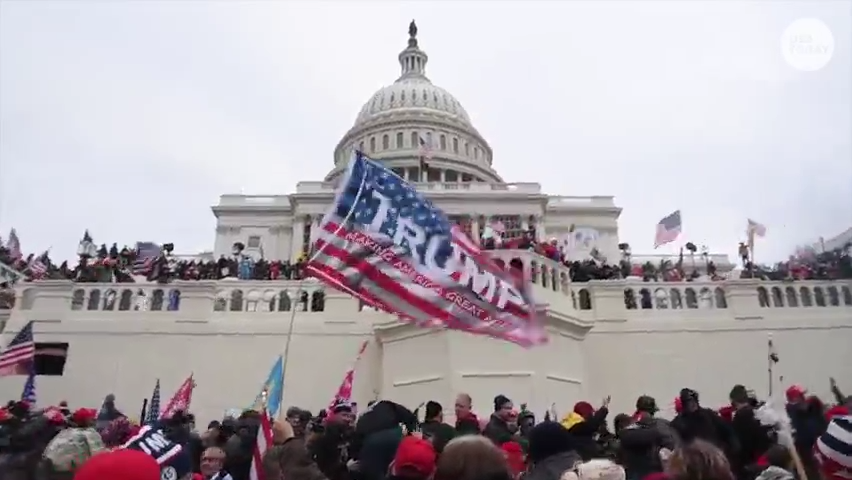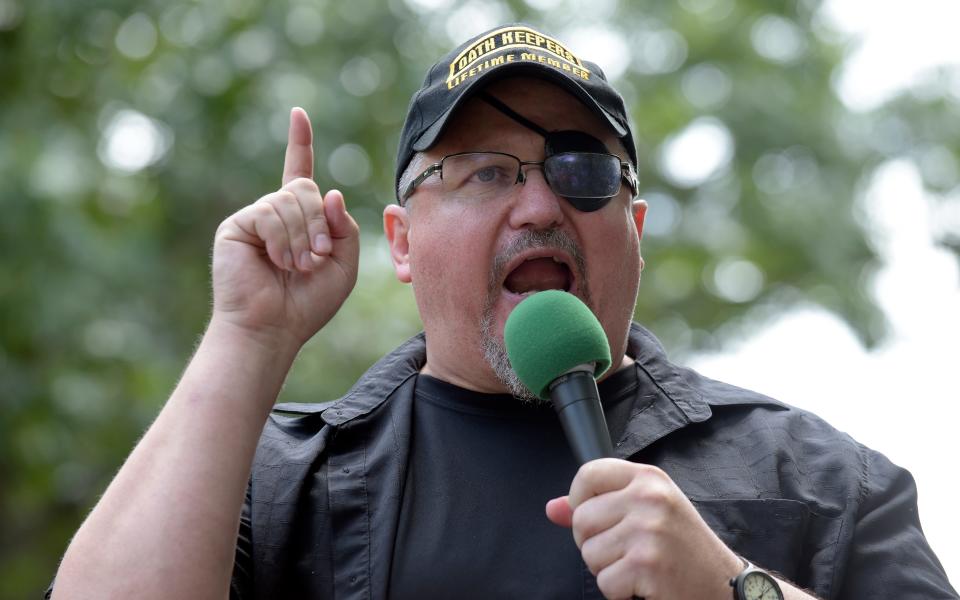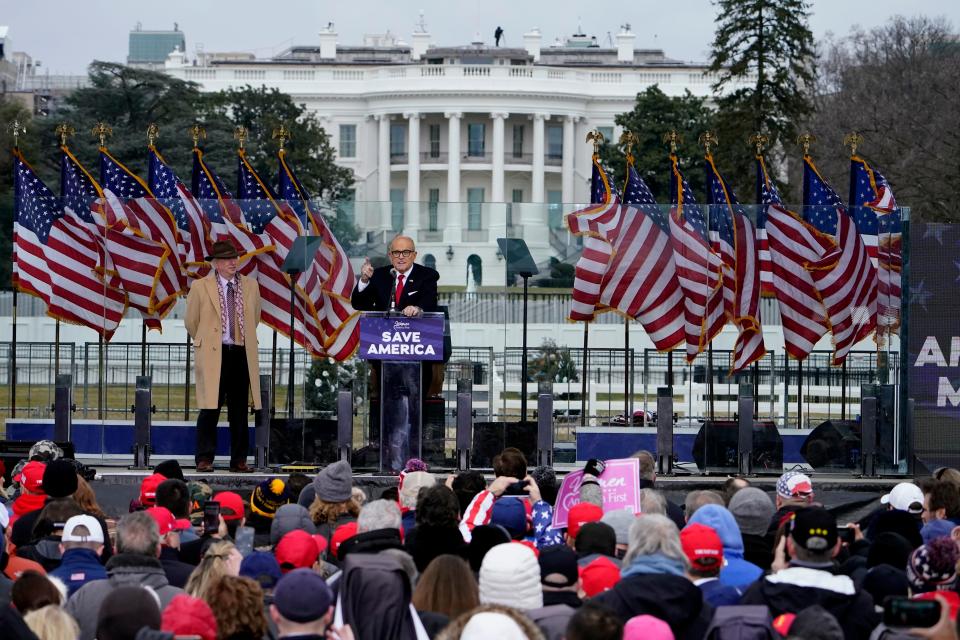Is there a link between Jan. 6 suspects and Trump's inner circle? FBI's questions show hunt is still on
- Oops!Something went wrong.Please try again later.
WASHINGTON – Federal investigators asked suspects in the Jan. 6 U.S. Capitol attack, including members of the far-right extremist group Oath Keepers, about possible links between Donald Trump, his inner circle and the rioters.
Federal prosecutors questioned defendants facing the most serious offenses and those who played cursory roles in the attack about possible connections to the former president and those close to him as the Justice Department continues a wide-ranging prosecution that's netted more than 725 arrests.
Brian Lockwood, a lawyer representing Oath Keepers member Mark Grods, told USA TODAY investigators tried to link Grods to Trump ally and longtime GOP political operative Roger Stone. Oath Keepers, including Grods, were deployed to provide security for Stone, who denied any participation in the attack.
Grods of Mobile, Alabama, pleaded guilty in June to conspiracy and obstruction of Congress, and he's cooperating with investigators. During several lengthy interviews with the FBI and federal prosecutors, Grods was asked general questions to get the full story of Jan. 6, but he had no firsthand information about Stone, Lockwood recalled.
“They asked a ton of open-ended questions when I was allowed to be there," he said, adding that he wasn't permitted to accompany Grods when he testified before a federal grand jury. "What happened next? What did you see? Who was there? What did you see them doing? What were they wearing? What were they doing? Did you see them communicating with other people?"
Though investigators tried to find a possible connection between Trump and efforts to halt Congress' counting of Electoral College votes, according to court records and interviews with defense lawyers, several defendants told investigators they had no links to Trump.
One of the defendants questioned about Trump was Brandon Straka, according to a sentencing memo from his lawyer. Straka, 45, who was arrested in Omaha, Nebraska, livestreamed the attack and had a large social media presence with 211,000 YouTube subscribers and 660,000 Twitter followers, according to court records. He pleaded guilty in October to disorderly conduct on Capitol grounds and was sentenced Monday to three years of probation and fined $5,000.
“During the interviews, the government was focused on establishing an organized conspiracy between defendant, President Donald J. Trump, and allies of the former president, to disrupt the Joint Session of Congress on January 6,” wrote Bilal Essayli, Straka's attorney, who didn't respond to calls seeking comment. “Defendant answered all questions truthfully and denied the existence of any such plot.”
The line of questioning illustrates how government prosecutors are documenting the attack and casting a wide net for potential conspirators in the violence that interrupted the counting of Electoral Votes in Congress.
“Nobody should be surprised that they are seeking this kind of information from cooperating witnesses,” said David Weinstein, a former federal prosecutor. “Whether it is a money-laundering conspiracy, drug-trafficking conspiracy or murder-for-hire conspiracy, that’s how these cases are built."
Patrick Cotter, a former federal prosecutor who worked extensively on organized crime cases, said investigators asking questions about possible links to others doesn’t mean Trump and high-profile associates are targets of an investigation.
"The technical term for Trump and most people the government is asking about this early is probably ‘subjects,’” Cotter said. “Subjects are people about whom the feds have not made any determination: They may turn out to be targets or witnesses” who have useful information but not criminal liability.

Oath Keepers and the Insurrection Act
Investigators focused on how rioters at the Capitol expected Trump to invoke the Insurrection Act as part of an alleged conspiracy to prevent the peaceful transfer of power from Trump to Joe Biden, according to court records and defense lawyers. Trump never used the centuries-old law to martial forces that could have derailed the electoral count and prevented Vice President Mike Pence from certifying election results.
“I'm just a small lawyer down in Mobile, but I'm confident that the government believes that the intent of the Jan. 6 incident was to trigger the president at the time to invoke the Insurrection Act,” Lockwood said.
The 1807 Insurrection Act authorizes the president to summon a militia to combat rebellion or the obstruction of laws. After the Civil War, Congress added a provision to permit the use of military force to protect civil rights. The act has been invoked dozens of times, including during rioting in Los Angeles in 1992 after police officers were acquitted in the beating of motorist Rodney King, according to a Congressional Research Service report.
Oath Keepers founder Stewart Rhodes, who was charged with seditious conspiracy, referred to the Insurrection Act two days before the attack, according to court records. Rhodes said Jan. 4, 2021, on the group’s website that teams would travel to Washington "well armed and equipped" to support Trump and serve as a militia if he asked them, according to court records.
"We don’t expect a need for him to call on us for that at this time, but we stand ready if he does (and we also stand ready to answer the call to serve as military anytime in the future, and anywhere in our nation, if he does invoke the Insurrection Act)," Stewart said, according to court records.
Several defendants discussed ways to defend Trump and protect him against being unseated. Rhodes stockpiled thousands of dollars of weapons, according to court records. On the Oath Keepers website, he encouraged patriots to support "President Trump’s fight to defeat the enemies foreign and domestic who are attempting a coup, through the massive vote fraud and related attacks on our Republic," according to court records.
The Oath Keepers have been at the heart of conspiracy charges from the attack, for allegedly coordinating their travel, participating in paramilitary training and communicating during the attack through encrypted apps. At least 56 people, including 23 members of the Oath Keepers, have been charged with conspiracy, and four have pleaded guilty. Conspiracy, which carries a potential five-year sentence, means two or more people planned a criminal act, even if they were unsuccessful.
The government charged 11 members of the Oath Keepers on Jan. 13 with the more serious charge of seditious conspiracy, which carries a potential 20-year sentence for trying to "overthrow, put down, or to destroy by force the Government of the United States” or “by force to prevent, hinder, or delay the execution of any law of the United States, or by force to seize, take, or possess any property of the United States."
Grods acknowledged bringing a shotgun and semiautomatic handgun to the area, which he left in a Northern Virginia hotel, and ferrying people to the Capitol in one of several golf carts the group used that day.
Lockwood downplayed Grods' position on Jan. 6, comparing him to a corporal who was simply following orders, rather than someone privy to high-level decisions. Information from Grods could be used to pressure higher-level participants into providing more information, Lockwood said.
In some cases, Weinstein said, lower-level operatives may point to other people, and their electronic communication could offer a “potential treasure trove” of information about the scope of the operation.
“By talking to the people identified early on, you hope you get to the top,” Weinstein said. “It’s never a waste of time to talk to anybody, no matter how low in the organization. You want to know what the conspiracy looks like.”

Early memo didn't find connection between Trump, allies and rioters
Though statements from Straka and Grods' attorneys point to an effort to connect Trump allies and the rioters, an initial probe came up short in finding any such link.
A prosecution memo was prepared between February and March 2021 outlining a path for seditious conspiracy charges, according to a source familiar with the investigation. Suspects were generally questioned about their connections to the speakers at Trump's rally before the Capitol attack, the source told USA TODAY. During that initial period, investigators found no formal direction to rioters from Trump, his personal lawyer Rudy Giuliani or political operatives Stone or Steve Bannon, the source said.
More: Jan. 6 committee examines how Capitol riot unfolded – and how to prevent it from happening again
The Justice Department declined to comment on the investigation. This month, Attorney General Merrick Garland pledged to pursue suspects in the Jan. 6 attack at "any level."
"The Justice Department remains committed to holding all Jan. 6 perpetrators, at any level, accountable under law – whether they were present that day or were otherwise criminally responsible for the assault on our democracy," Garland said in a speech the day before the anniversary of the attack. "We will follow the facts wherever they lead."
Trump and his allies such as Giuliani, who spoke at his rally, haven't been charged criminally in the conspiracy. Trump's and Giuliani's lawyers argued in civil lawsuits stemming from the attack that they can't be held liable for the violent actions of people who listened to their speeches.
Stone spoke at a rally Jan. 5 outside the Supreme Court but not at Trump's "Stop the Steal" rally Jan. 6 or at the Capitol.
"I stress yet again that I was not on the Ellipse. I did not march to the Capitol. I was not at the Capitol," Stone told reporters Dec. 17 after refusing to answer questions from a House committee under his Fifth Amendment right against self-incrimination. "And any claim, assertion or even implication that I knew about or was involved in any way whatsoever with the illegal and politically counterproductive activities of Jan. 6 is categorically false."

Some Jan. 6 defendants weren't asked about Trump links
Robert Jenkins, a lawyer representing seven defendants who don't face seditious conspiracy charges from Jan. 6 and a grand jury witness, told USA TODAY that investigators asked none of his clients about Trump or Stone. Jenkins said questions dealt with the participation of others.
“I have not heard Roger Stone's name mentioned. I have not heard anyone who was inside of the White House on Jan. 6's name mentioned,” Jenkins said. “And I can tell you that those questions certainly surround other individuals and their knowledge and their participation.”
Jenkins said he thought investigators were trying to expand the conspiracy case. Federal investigators continue to hunt for participants in the riot, and charges could be upgraded against some of the hundreds of defendants who have been arrested.
"I can tell you that certainly what I suspect based on my knowledge is that they are attempting to build it out,” Jenkins said.
Another lawyer, who represents a defendant charged with conspiracy and who spoke on background, said it was stupid to question defendants low in the Oath Keepers hierarchy about connections to Trump. The lawyer compared asking his client about talking to Trump to asking whether he knew anyone from Mars.
Cotter, the former federal prosecutor, said it would be "law enforcement malpractice" not to ask such questions to a "cooperator."
"The challenge in any conspiracy case for the government is that, to prove a person is a co-conspirator, the government must find sufficient evidence that the person, by word or deed, knew of the conspiracy and agreed with the illegal goal of the conspiracy," he said. "Then, if any member of the conspiracy takes a meaningful action to achieve the illegal goal, then all the co-conspirators are responsible.”
This article originally appeared on USA TODAY: FBI seeks links between Jan. 6 attack suspects, Trump's inner circle

